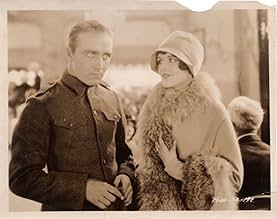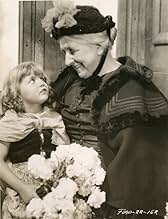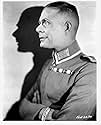A family saga in which three sons of a Bavarian widow go to war for Germany and the fourth goes to America, Germany's eventual opponent.A family saga in which three sons of a Bavarian widow go to war for Germany and the fourth goes to America, Germany's eventual opponent.A family saga in which three sons of a Bavarian widow go to war for Germany and the fourth goes to America, Germany's eventual opponent.
- Awards
- 3 wins total
Frank Baker
- Soldier
- (uncredited)
George Blagoi
- Officer
- (uncredited)
Stanley Blystone
- Officer
- (uncredited)
Carl Boheme
- Officer
- (uncredited)
Constant Franke
- Officer
- (uncredited)
Featured reviews
Sentimental, but not mawkish, the early John Ford silent, "Four Sons," is a well made film that exemplifies early 20th century values. The four sons of a Bavarian widow are swept up in the events of World War I. Three of the boys fight for the Kaiser, while the fourth, who had emigrated to the United States, is on the opposite side. The screenplay does not dwell on politics, although the German officers have villainous characters, and the American son chastises an employee for advocating war, because "America is neutral." Most of the action takes place in a small village in Bavaria, and the unspoken message is that ordinary Germans are as kind and feeling as people everywhere.
Despite a predictable storyline, the performances avoid the "grand style" that gave silent acting a bad name. Made in 1928 at the apogee of the American silent era, John Ford's direction is solid, and the film foreshadows his adaptation of "How Green Was My Valley" more than a decade later. Certainly the two strong mothers who suffer the absence of their sons have much in common. If John Ford had not directed "Four Sons," the film could have been largely forgotten. Plot holes abound, and coincidences occur that "only happen in the movies." However, the film is a good example of popular entertainment in the late silent era, and modern audiences will likely be engaged, especially students of Ford and those with an affection for silent movies.
Despite a predictable storyline, the performances avoid the "grand style" that gave silent acting a bad name. Made in 1928 at the apogee of the American silent era, John Ford's direction is solid, and the film foreshadows his adaptation of "How Green Was My Valley" more than a decade later. Certainly the two strong mothers who suffer the absence of their sons have much in common. If John Ford had not directed "Four Sons," the film could have been largely forgotten. Plot holes abound, and coincidences occur that "only happen in the movies." However, the film is a good example of popular entertainment in the late silent era, and modern audiences will likely be engaged, especially students of Ford and those with an affection for silent movies.
In Germany, at the dawn of World War I, widow Margaret Mann (as Frau Bernle) is blessed with "Four Sons" - strapping soldier Francis X. Bushman Jr. (as Franz), dreamy rustic James Hall (as Joseph), handsome metalworker Charles Morton (as Johann), and fair-haired shepherd George Meeker (as Andreas). And, she makes the best honey-cakes in Bavaria. With one son serving the Fatherland, and two more about to join him on the battlefield, Ms. Mann arranges for adventurous Mr. Hall to emigrate to democratic America. There, he opens a delicatessen and marries sweet, beautiful June Collyer (as Annabelle). Eventually, the Great War results in multiple brother tragedies, testing old mother Mann's ability to count her blessings.
The last years of the "silent film" era produced an avalanche of stunning motion pictures; in hindsight, you wonder if the "talkie" might have prevented the silent from advancing even beyond its late 1920s peak. "Four Sons" is another artful example, with John Ford and his picturesque cameramen, George Schneiderman and Charles C. Clarke, directing under the influence of F.W. Murnau - the combination produced a winning film, full of memorable scenes and images. Ford's best symbolic double whammy has two white birds flying to heaven, followed by postman Albert Gran hurling stoning the church's reflection. The restored print looks lovely, but lacks the original's innovative "synchronized sound effects" track, which will hopefully turn up somewhere.
The film won the "Best Picture" of 1928 medal from "Photoplay" and placed #4 on the annual "Film Daily" honor roll.
********* Four Sons (2/13/28) John Ford ~ Margaret Mann, James Hall, George Meeker, Charles Morton
The last years of the "silent film" era produced an avalanche of stunning motion pictures; in hindsight, you wonder if the "talkie" might have prevented the silent from advancing even beyond its late 1920s peak. "Four Sons" is another artful example, with John Ford and his picturesque cameramen, George Schneiderman and Charles C. Clarke, directing under the influence of F.W. Murnau - the combination produced a winning film, full of memorable scenes and images. Ford's best symbolic double whammy has two white birds flying to heaven, followed by postman Albert Gran hurling stoning the church's reflection. The restored print looks lovely, but lacks the original's innovative "synchronized sound effects" track, which will hopefully turn up somewhere.
The film won the "Best Picture" of 1928 medal from "Photoplay" and placed #4 on the annual "Film Daily" honor roll.
********* Four Sons (2/13/28) John Ford ~ Margaret Mann, James Hall, George Meeker, Charles Morton
The biggest interest point for me seeing 'Four Sons' was John Ford, a truly fine director and a versatile one, doing many films in many different genres. Including from personal opinion the definitive director of the Western genre. Also really liked the subject matter and appreciate silent film hugely, the positive reception to the film also helped. Even if there was the potential trap of it being too melodramatic and over-emotive, though actually it sounded very emotional.
'Four Sons' turned out to be exactly that. While it may not be one of the great director's very best or most iconic films (am most familiar with his films from the 40s and 50s decades), it is one of his best early ones and one of not many to be properly great. 'Four Sons' overcomes all the potential limitations that silent film can have that have eluded quite a few films around this time and to me it was definitely more genuinely emotional than it was overly melodramatic.
Very, very little wrong, though the brothers' reunion on the battlefield did seem too much of a too much by chance coincidence.
However, 'Four Sons' is incredibly well made. Ford's films always did look great, namely in his Westerns with how the photography captured those majestic locations. Even for so early on there is nothing primitive looking here, it is beautifully and atmospherically filmed and really admired the attention to detail in the setting. The farewell to wife scene is one of the standouts of particularly well shot scenes. The music is haunting and has an emotional but not overwrought edge.
Moreover, Ford directs with ease and doesn't seem uncomfortable or uninterested. 'Four Sons' is incredibly moving, of all my recent first time viewings this is easily in the top 3 films that made me weep the most. Hankies and tissues are absolutely needed for the heart-breaking climax, though there is emotional impact throughout without it getting too heavy. The film is always compelling with not a dull stretch.
All the acting is more than fine, Margaret Mann's performance is an affecting powerhouse and should have gotten some award consideration.
Summing up, great. 9/10
'Four Sons' turned out to be exactly that. While it may not be one of the great director's very best or most iconic films (am most familiar with his films from the 40s and 50s decades), it is one of his best early ones and one of not many to be properly great. 'Four Sons' overcomes all the potential limitations that silent film can have that have eluded quite a few films around this time and to me it was definitely more genuinely emotional than it was overly melodramatic.
Very, very little wrong, though the brothers' reunion on the battlefield did seem too much of a too much by chance coincidence.
However, 'Four Sons' is incredibly well made. Ford's films always did look great, namely in his Westerns with how the photography captured those majestic locations. Even for so early on there is nothing primitive looking here, it is beautifully and atmospherically filmed and really admired the attention to detail in the setting. The farewell to wife scene is one of the standouts of particularly well shot scenes. The music is haunting and has an emotional but not overwrought edge.
Moreover, Ford directs with ease and doesn't seem uncomfortable or uninterested. 'Four Sons' is incredibly moving, of all my recent first time viewings this is easily in the top 3 films that made me weep the most. Hankies and tissues are absolutely needed for the heart-breaking climax, though there is emotional impact throughout without it getting too heavy. The film is always compelling with not a dull stretch.
All the acting is more than fine, Margaret Mann's performance is an affecting powerhouse and should have gotten some award consideration.
Summing up, great. 9/10
John Ford is truly great filmmaker this is the pinnacle (well in my opinion) of silent film. Margaret Mann is a revelation her performance is so enthralling especially in some of the final scenes at the end of the picture.
The story is a strong one but the direction and the way it is put together is truly sensational Ford himself is Irish and this film i feel may be close to his roots.
I was amazed the film didn't have many title cards however it was so simple to follow and by the end of it you're moved by mann's performance. you feel and care for the characters the whole way through that's the mark of a great film.
And for the film buffs watch the early scenes in the film you got to love the tracking shot the mark of master John Ford
The story is a strong one but the direction and the way it is put together is truly sensational Ford himself is Irish and this film i feel may be close to his roots.
I was amazed the film didn't have many title cards however it was so simple to follow and by the end of it you're moved by mann's performance. you feel and care for the characters the whole way through that's the mark of a great film.
And for the film buffs watch the early scenes in the film you got to love the tracking shot the mark of master John Ford
By chance I wound up watching this wonderfully beautifully crafted film on all counts this evening on Turner. The film work is masterfully done with John Ford's usual care and sensitivity to his audience. Mary Mann is outstanding as the mother of her ever faithful sons who go to war. Many will remember her right away as the sweet Grandma in The Little Rascals "Go fly a Kite" and proves what a powerful performer she was and it's a pity she was not given more opportunities.
James Hall who plays Joseph who goes to America to seek his fortune is a real find and I would like to know more about him. Handsome and quite charming and it's puzzling why he was not utilized in his career as well. A silent film that would be a nice introduction to anyone who has been hesitant about watching this lost art form. Worth the time and love to own this if it ever comes out in DVD.
James Hall who plays Joseph who goes to America to seek his fortune is a real find and I would like to know more about him. Handsome and quite charming and it's puzzling why he was not utilized in his career as well. A silent film that would be a nice introduction to anyone who has been hesitant about watching this lost art form. Worth the time and love to own this if it ever comes out in DVD.
Did you know
- TriviaThe film set a permanent attendance record at New York's Roxy Theater
- GoofsIn the New York City sequences, which take place immediately after World War I (1919-1920), all of the women's fashions are strictly in the style of 1928, and all of the automobiles are of late-1920s design.
- Quotes
The Schoolmaster: Books, Herr Postman, are friends that never deceive,
- ConnectionsFeatured in Hollywood (1980)
- SoundtracksLittle Mother
(1928) (uncredited)
Music by Erno Rapee
Lyrics by Lew Pollack
Sung by Harold Van Duzee and the Roxy Male Quartette
Details
Box office
- Gross US & Canada
- $3,270,000
- Runtime
- 1h 40m(100 min)
Contribute to this page
Suggest an edit or add missing content



































